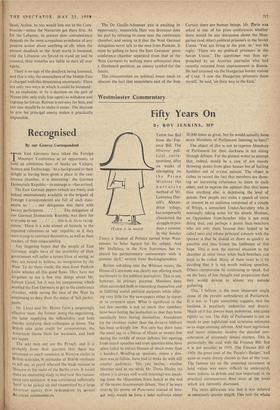Recognised
By our Geneva Correspondent rriliE East Germans have taken' the, Foreign 1 Ministers' Conference as an opportunity to hold an exhibition here of books on 'Culture, Science and Technology.' As a background to their delight at having been given a place in the con- ference chamber, it is interesting : the German Democratic Republic—its message is—has arrived.
The East German papers (which are freely and indeed ostentatiously available to the brigade of Foreign Correspondents) are full of such state- ments as '. . . our delegation was there with twenty participants. . . .". . . The delegation of mit' German Democratic Republic was there for everyone to see. . . .". . . this is de facto recog- nition.' There is a note almost of hysteria in the repeated references to 'our' republic, as if they were trying to convince themselves, as well as their readers, of their respectability.
Any lingering hopes that the people of East Germany might have of the instability of their government will suffer a severe blow at seeing, as they are bound to believe, its recognition by the West. To do them credit, the men from Pankow know whence all this good flows. They have not forgotten to say a few nice things about Mr. Selwyn Lloyd, for it was his compromise which enabled the East Germans to get in the conference chamber, while saving the face of the West by continuing to deny them the status of 'full partici- pants,' Mr. Lloyd and Mr. Herter form a surprisingly effective team; the former doing the negotiating, the latter supplying the inflexibility, and both thereby satisfying their colleagues at home. The British take quiet credit for compromises. the Americans blame them for weakness, and both are happy.
The odd men out are the French. and it is probably from their quarters that there has emanated so much suspicion in Western circles at British activities, in particular of British readiness to sell out, as proof whereof the trade mission in Moscow in the midst of the Berlin crisis. It would make an interesting study to find how this rumour came into existence; it was considered sufficiently 'hard' to be picked up and transmitted by a large American agency then re-broadcast by several An.erican commentators. • The De Gaulle-Adenauer axis is awaiting its opportunity; meanwhile Herr von Brentano does his part by refusing to come near the conference chamber, and seeing to it that the West German delegation never talk to the men from Pankow. It must be galling to have the East Germans' press conference chamber separated from that of the West Germans by nothing more substantial than a fibreboard partition, an uneasy symbol for the future.
The concentration on political issues tends to obscure the fact that somewhere east of the Iron Curtain there are human beings. Mr. Zorin was asked at one of his press conferences whether there would be any discussion about the Hun- garian (and other) political prisoners in the Soviet Union. 'You are living in the past, sir,' was his reply. 'There are no ,political prisoners in the Soviet Union.' The questioner was then ap- proached by an Austrian journalist who had recently returned from imprisonment in Russia. He had returned via the Hungarian border station of Csap. 'I saw the Hungarian prisoners there myself,' he said, 'on their way to the East.'






































 Previous page
Previous page